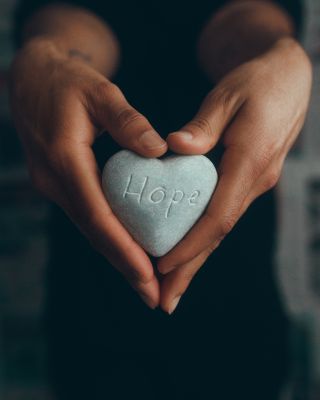Grief
Finding Hope in Grief
Personal Perspective: What can we hope for through all this pain?
Posted August 30, 2023 Reviewed by Gary Drevitch
Key points
- The early, dark days of grief can feel hopeless.
- Others will hold out the hope of waning pain for you, since that can be hard to imagine.
- Because we can't change what has happened, hope must focus on the future.

A man wrote to me two weeks after his wife had died, and then again a couple of weeks later. He was ambivalent about this blog, on one hand finding the shared experience validating and on the other also finding in it his worst fears about the grieving process.
Please write something hopeful, he pleaded.
I’ve been thinking about that a lot. Hopeful. What is hope in this context? What can he hope for? What do I hope for?
Hope is an active state. It requires intentionality and must be nurtured. We can sink into hopelessness, so we must swim toward hope. It will not find us unless we look for it.
Some hope is wishful thinking
The bottom-line hope to which we all cling in a deep, dark, secret corner of our hearts, is that one of these days our loved ones will walk back through the door and life will resume as intended. We know it won’t happen, but we didn’t think death would happen either, so who’s to say? We can hope, can’t we?
Yeah, okay. I know.
In the earliest days, the second-most-hoped-for thing for is a magic word or incantation or concept that will make the most intense anguish we have ever experienced disappear. In those early days, we turn with hopeful eyes to books and support groups and experts, asking, “How do I stop hurting? How do I make this pain go away?” And we learn soon enough that this is another futile hope. You can’t go around the pain, you can only go through it and endure the unendurable. And, sad to say, if you’re in the early days, it might get worse before it gets better. Believe it or not, our brain does try to protect us, letting in only as much pain as it thinks we are capable of withstanding at any given moment. As I’ve discussed here before, I didn’t even really start crying until three months in, when the shock and numbness wore off.
The raw pain won't last
Still, people who are further along in their grief invariably proffer to new members of the sad club the only hope they have, and I offer it to my grieving correspondent and anyone else in the early stages: It does get better. I know that this barely even makes sense if you are in the first throes of grief—better? what does that even mean?—but it’s the truth. The hurt continues, but not in the same way. I’ve written a lot about how grief evolves over time, and this may just be something you have to experience to understand, so those of us who have reached that wisdom hold out that hope for those who aren't there yet. Yes, the pain persists, but it ebbs to become a softer ache with intermittent intervals of anguish. I don’t know if those ever go away. I hope they do. But I also hope they don’t. Those pangs feel like love pains that keep me connected to Tom—a sort of tug at my heart from him.
Look forward instead of back
And now, three years into my grief, what hopes do I have?
I hope, first of all, that wherever he is, Tom is happy, and that he knows I loved him to the very best of my ability. I hope that even as he left this plane, he felt that love.
I hope that the path to my future will eventually reveal itself to me. Losing Tom suddenly upended my life, and I’ve been tumbling in freefall ever since, not sure who I am, what I’m supposed to do, or where I should be. My marriage gave my life—and my very self—a sort of structure that has now collapsed, and I have no clear vision of my future as I trudge into it. I hope things become clear eventually.
I hope not to live the rest of my life without love and that I may someday find someone else I am inclined to let into my well-protected heart. At least I think that’s what I hope for. I go back and forth on this. Tom shaped my understanding of love and marriage, and it’s hard to imagine adjusting to anyone else—especially in this, the late afternoon of my life. But I hope that I can at least remain open to the idea. Although I still wallow in nostalgia for that which is lost, I hope not to live in the past for the rest of my life.
I hope I am neither burdening people with my grief nor hiding it, but simply living my experience honestly and openly. We are a grief-illiterate society and I feel like I’ve been introduced to some hard but crucial realities. I hope that in speaking openly about my grief I am giving people information they may draw on later when they need it.
And of course, I hope to be happy again someday. Genuinely happy, without the asterisk that appends even good days these days. I hope that that grief becomes simply part of my life experience and not the experience that overshadows all else. And I hope that someday, as my grief guru David Kessler says, I am able to remember Tom with more love than pain.
And I hope that for all of us.




